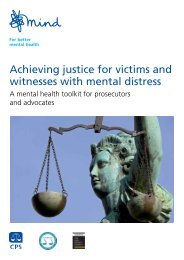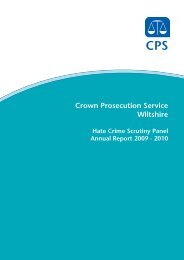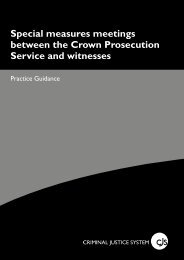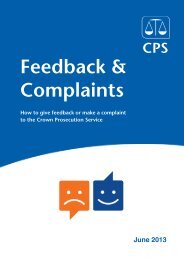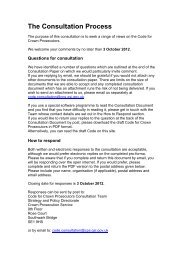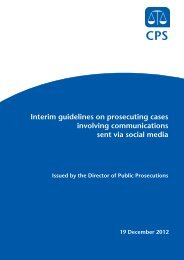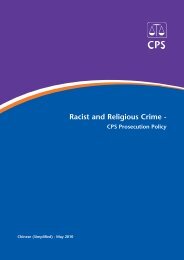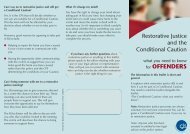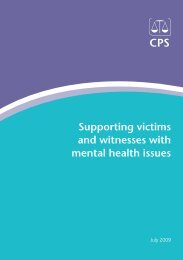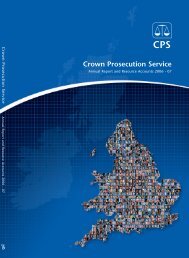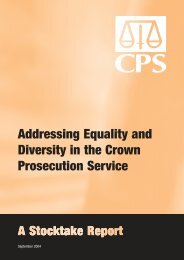CPS Policy on Prosecuting Criminal Cases Involving Children and ...
CPS Policy on Prosecuting Criminal Cases Involving Children and ...
CPS Policy on Prosecuting Criminal Cases Involving Children and ...
Create successful ePaper yourself
Turn your PDF publications into a flip-book with our unique Google optimized e-Paper software.
Pers<strong>on</strong>al informati<strong>on</strong>There may be pers<strong>on</strong>al informati<strong>on</strong> about a victim or witness that is not used as evidencein the case. It may be relevant background, <strong>and</strong> could assist us (or the defence team) inmaking decisi<strong>on</strong>s or preparing for a trial.There are rules that c<strong>on</strong>trol when informati<strong>on</strong> like this is given to the defence team;Disclosure: A protocol for c<strong>on</strong>trol <strong>and</strong> managment of unused material in the Crown Court.We will apply these rules strictly to make sure that such informati<strong>on</strong> is <strong>on</strong>ly h<strong>and</strong>ed overwhen absolutely necessary, or when the court orders us to do so; Attorney General'sGuidelines <strong>on</strong> disclosure.Therapy <strong>and</strong> counsellingPutting children firstThere are times when children need help to get over what has happened if they have beenvictims or witnesses.We will never say that a child cannot have therapy or counselling until the trial is over. Achild's need for therapy or counselling comes first. We have a separate booklet that dealswith therapy for children. (See list of publicati<strong>on</strong>s <strong>and</strong> materials below).Giving adviceWe need to know if a child has had, or needs to have, therapy before the trial. We have toc<strong>on</strong>sider the possible impact <strong>on</strong> the trial. We also have to tell the defence team that awitness has had therapy or counselling if it is relevant to the case.There are c<strong>on</strong>cerns that some therapies may c<strong>on</strong>taminate the evidence a child will give <strong>and</strong>undermine a prosecuti<strong>on</strong> (hypnotherapy, psychodrama, regressi<strong>on</strong> techniques <strong>and</strong>unstructured groups). We can give advice about what types of therapy or counselling willbe likely to harm the trial.We may, in some cases, have to decide not to go ahead with a case if <strong>on</strong>e of thesetherapies is used, but a child's need for therapy or counselling must come first.Making the decisi<strong>on</strong>People with the right skills, such as social workers, doctors <strong>and</strong> therapists are the <strong>on</strong>es tosay what the child needs, after talking to the child <strong>and</strong> his or her parents or carers.We do not make decisi<strong>on</strong>s about whether a child needs therapy or counselling, but we willwork with every<strong>on</strong>e c<strong>on</strong>cerned to make sure the child receives the support that matcheshis or her particular needs.Support schemesThere are schemes for child witnesses in some parts of the country to help children getready for the trial <strong>and</strong> to support them to feel as relaxed as possible when giving evidence.Witness supporters can help children by:explaining what will happen at the trialhelping them be c<strong>on</strong>fident enough to say if they d<strong>on</strong>'t underst<strong>and</strong> the questi<strong>on</strong> or needhelp.



